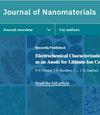Characteristics and Electrochemical Performance of Hydroxyl-Functionalized Graphene Quantum Dot-Coated Si Nanoparticles/Reduced Graphene Hybrid Anodes for Advanced Li-Ion Batteries
4区 材料科学
Q2 Materials Science
引用次数: 0
Abstract
By powering sophisticated lithium-ion batteries (LIBs), silicon/carbon (Si/C) composites have the potential to accelerate the sustainable energy transition. This is a first-of-its-kind Si/C hybrid with hydroxyl-functionalized graphene quantum dots (OH-GQD) electrostatically assembled within interconnected reduced graphene oxide networks (OH-GQD@Si/rGO) prepared through solution-phase ultrasonication and subsequent one-step, low-temperature annealing and thermal reduction. The OH-GQD@Si/rGO hybrid utilized as the LIB anode delivered a high initial specific capacity of 2,229.16, 1,303.21, and 1,090.13 mAh g−1 reversible capacities at 100 mA g−1 after 50 and 100 cycles, and recovered 1,473.28 mAh g−1 at rates as high as 5 A g−1. The synergistic benefits of the OH-GQD/rGO interface give dual, conductive carbon protection to silicon nanoparticles. Consecutive Si surface modifications improved Si–rGO contact modes. The initial OH-GQD carbon coating increased storage capacity through vacancy defects changing the electron density in the lattice, whereas hydroxyl functionality at the edges acted as active storage sites. Secondary protection through rGO encapsulation improved Si conductivity and usage by providing continuous electron/ion routes while minimizing Si volume variations. The proposed OH-GQD/rGO hybridization as a dual-carbon protection strategy to Si stabilized the solid electrolyte interface leading to electrode stability. This work is expected to advance the development of next-generation Si-based LIB anodes.先进锂离子电池用羟基功能化石墨烯量子点包覆纳米硅/还原石墨烯复合阳极的特性及电化学性能
通过为复杂的锂离子电池(lib)供电,硅/碳(Si/C)复合材料有可能加速可持续能源转型。这是一种首个将羟基功能化石墨烯量子点(OH-GQD)静电组装在相互连接的还原氧化石墨烯网络(OH-GQD@Si/rGO)内的硅/碳杂化材料,通过液相超声和随后的一步低温退火和热还原制备。OH-GQD@Si/rGO混合材料用作锂离子电池阳极,在50和100次循环后,在100 mA g - 1下的可逆容量分别为2,229.16、1,303.21和1,090.13 mAh g - 1,在高达5 a g - 1的速率下恢复容量为1,473.28 mAh g - 1。OH-GQD/rGO界面的协同效应为硅纳米颗粒提供了双重导电碳保护。连续的Si表面修饰改善了Si - rgo的接触模式。初始OH-GQD碳涂层通过空位缺陷改变晶格中的电子密度增加了存储容量,而边缘的羟基官能团充当了活性存储位点。通过还原氧化石墨烯封装的二次保护通过提供连续的电子/离子路线提高了硅的导电性和使用,同时最大限度地减少了硅的体积变化。提出OH-GQD/rGO杂化作为一种双碳保护策略来稳定固体电解质界面,从而提高电极的稳定性。这项工作有望推动下一代硅基锂离子电池阳极的发展。
本文章由计算机程序翻译,如有差异,请以英文原文为准。
求助全文
约1分钟内获得全文
求助全文
来源期刊

Journal of Nanomaterials
工程技术-材料科学:综合
CiteScore
6.10
自引率
0.00%
发文量
577
审稿时长
2.3 months
期刊介绍:
The overall aim of the Journal of Nanomaterials is to bring science and applications together on nanoscale and nanostructured materials with emphasis on synthesis, processing, characterization, and applications of materials containing true nanosize dimensions or nanostructures that enable novel/enhanced properties or functions. It is directed at both academic researchers and practicing engineers. Journal of Nanomaterials will highlight the continued growth and new challenges in nanomaterials science, engineering, and nanotechnology, both for application development and for basic research.
 求助内容:
求助内容: 应助结果提醒方式:
应助结果提醒方式:


